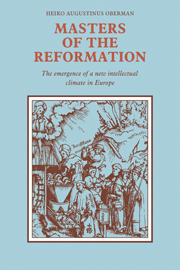Book contents
- Frontmatter
- Contents
- Preface
- Abbreviations
- Map
- PART I INTELLECTUAL RENEWAL
- 1 The ivory tower: the university as observatory
- 2 The impact of humanism: fact and fancy
- 3 The scholastic rift: a parting of the ways
- 4 The devotio moderna: movement and mystery
- 5 Patterns of thought on the eve of upheaval
- 6 The Augustine renaissance in the later Middle Ages
- PART II THE GRAPES OF WRATH
- PART III NEW JERUSALEM WITHIN THE OLD WALLS
- Student population at German universities 1385–1540
- Chronological outline
- Bibliography
- Index of names and places
- Index of modern authors
- Subject index
6 - The Augustine renaissance in the later Middle Ages
Published online by Cambridge University Press: 07 October 2011
- Frontmatter
- Contents
- Preface
- Abbreviations
- Map
- PART I INTELLECTUAL RENEWAL
- 1 The ivory tower: the university as observatory
- 2 The impact of humanism: fact and fancy
- 3 The scholastic rift: a parting of the ways
- 4 The devotio moderna: movement and mystery
- 5 Patterns of thought on the eve of upheaval
- 6 The Augustine renaissance in the later Middle Ages
- PART II THE GRAPES OF WRATH
- PART III NEW JERUSALEM WITHIN THE OLD WALLS
- Student population at German universities 1385–1540
- Chronological outline
- Bibliography
- Index of names and places
- Index of modern authors
- Subject index
Summary
There is probably no phase of medieval intellectual life that could not be portrayed as having reassessed and redigested the Augustinian legacy. Yet, in the middle of the fourteenth century we encounter a novel appropriation of that heritage which permitted Augustine to speak not merely as one of the four church fathers but also as an eminent gospel exegete. In seeking a proper understanding of this development, researchers have already encountered considerable difficulties. An ‘Augustinian school’ has been christened amid a mixture of enthusiasm and conviction but the subsequent explorations have been marred by question-marks and outright gaps in the documentary log. The final resolution of key problems must await intensive source study based on new and reliable editions equipped to deal critically with questions of textual transmission.
Whereas the term ‘schola moderna Augustiniana’ has quite properly entered the historian's vocabulary to stay, the interpretation of the unmistakable references to an ‘Augustinian school’ rests for the present on working hypotheses. And answers to the questions surrounding this ‘Augustinian school’ must be pursued in conjunction with the study of the transmission and reception of the Augustinian corpus both within and without the Augustinian order. In this regard the fourteenth century once more constitutes a historical watershed.
The first pebbles were cast into the pond by the nearly simultaneous beginnings of an academic Augustinianism mirrored in the writings of Thomas Bradwardine (†l349) and Gregory of Rimini (†l358); an Augustinianism linked in a manner as yet unexplained with English proto-humanism and early Italian humanism respectively.
- Type
- Chapter
- Information
- Masters of the ReformationThe Emergence of a New Intellectual Climate in Europe, pp. 64 - 110Publisher: Cambridge University PressPrint publication year: 1981



